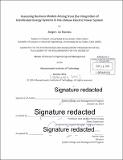| dc.contributor.advisor | Jose Ignacio Pérez Arriaga. | en_US |
| dc.contributor.author | Le Dantec, Jorge I. (Jorge Ignacio) | en_US |
| dc.contributor.other | System Design and Management Program. | en_US |
| dc.coverage.spatial | s-cl--- | en_US |
| dc.date.accessioned | 2014-10-08T15:24:31Z | |
| dc.date.available | 2014-10-08T15:24:31Z | |
| dc.date.copyright | 2014 | en_US |
| dc.date.issued | 2014 | en_US |
| dc.identifier.uri | http://hdl.handle.net/1721.1/90714 | |
| dc.description | Thesis: S.M. in Engineering and Management, Massachusetts Institute of Technology, Engineering Systems Division, System Design and Management Program, 2014. | en_US |
| dc.description | Cataloged from PDF version of thesis. | en_US |
| dc.description | Includes bibliographical references (pages 83-84). | en_US |
| dc.description.abstract | Electric power systems are more than just networks of generation, transmission and distribution assets. They are socio-technical systems, involving regulation, markets and technology availability. Presently, the dynamic relation among these aspects is creating new consumer needs in many power systems around the world, which incumbent electricity utilities do not seem well suited to meet at the required pace. In this context, the integration of Distributed Energy Systems (DESs) and their related business models appears as a flexible and often more affordable option to deliver value, by fulfilling the unmet needs of both consumers and utilities. To advice Chilean electric power system's stakeholders about the adequacy of a set of DES-related business models to Chilean needs, this document presents a systematic analysis, which focuses on the interrelation between business model attributes, involved DES technologies, and stakeholder needs. Specifically, an analytic framework is developed and applied to some business models currently operative in other markets, measuring their adequacy to meet stakeholders' needs in a set of envisioned scenarios of Chile's power system. This work provides a systematic tool for decision-making processes in selecting business models, when the decision must be made with qualitative data. Moreover, the evaluation in the Chilean system of actual business models shows results that should be valuable for consumers, utilities, and regulators. | en_US |
| dc.description.statementofresponsibility | by Jorge I. Le Dantec. | en_US |
| dc.format.extent | 92 pages | en_US |
| dc.language.iso | eng | en_US |
| dc.publisher | Massachusetts Institute of Technology | en_US |
| dc.rights | M.I.T. theses are protected by copyright. They may be viewed from this source for any purpose, but reproduction or distribution in any format is prohibited without written permission. See provided URL for inquiries about permission. | en_US |
| dc.rights.uri | http://dspace.mit.edu/handle/1721.1/7582 | en_US |
| dc.subject | Engineering Systems Division. | en_US |
| dc.subject | System Design and Management Program. | en_US |
| dc.title | Assessing business models arising from the integration of distributed energy systems in the Chilean electric power system | en_US |
| dc.type | Thesis | en_US |
| dc.description.degree | S.M. in Engineering and Management | en_US |
| dc.contributor.department | System Design and Management Program. | en_US |
| dc.contributor.department | Massachusetts Institute of Technology. Engineering Systems Division | |
| dc.identifier.oclc | 891077908 | en_US |
